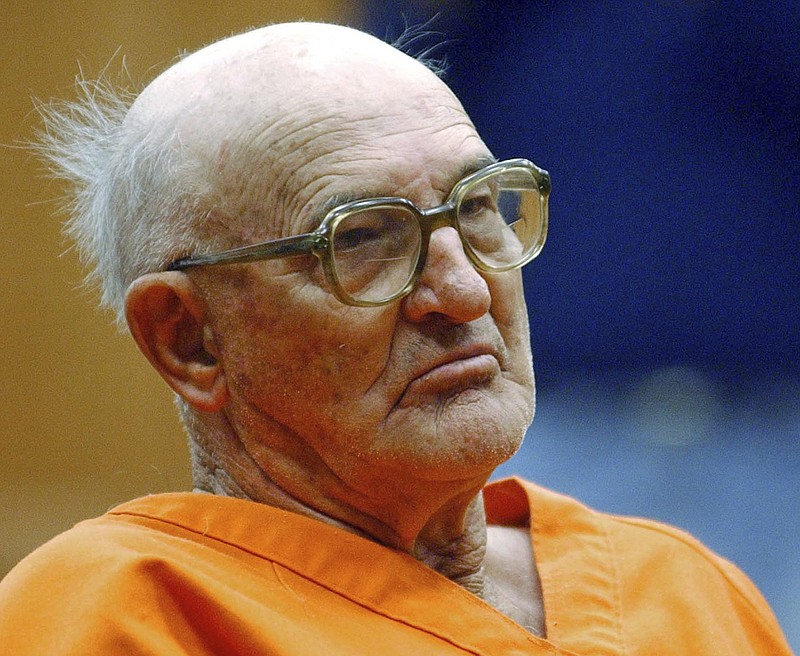Edgar Ray Killen, the former Klansman who was sentenced to a 60-year prison term in 2005 for arranging the murders of three young civil rights workers outside Philadelphia, Miss., in 1964 during the Freedom Summer drive to register Southern black voters, died Thursday night in prison in Parchman, Miss. He was 92.
The Mississippi corrections department said he was pronounced dead at the hospital at the Mississippi State Penitentiary at 9 p.m. No cause was given, but the department said he had been treated for congestive heart failure and hypertension.
Killen was convicted of state manslaughter charges 41 years to the day after James Earl Chaney, 21, a black man from Meridian, Miss., and two white New Yorkers, Andrew Goodman, 20, and Michael Schwerner, 24, disappeared in a death trap set by a local deputy sheriff and a gang of his fellow Ku Klux Klansmen.
He was prosecuted in one of the South's major "atonement" trials, in which Mississippi authorities revisited civil rights-era atrocities. He was convicted of a crime that galvanized the civil rights movement, stamped the town of Philadelphia as an outpost of terror and inspired the 1988 Hollywood movie "Mississippi Burning," directed by Alan Parker.
Killen was a founding member of the Klan in the Philadelphia area and its chief recruiter, according to the FBI. He had been among 18 men tried in 1967 on federal charges of conspiring to violate the civil rights of Chaney, Goodman and Schwerner.
They were shot to death on the night of June 21, 1964. After an extensive search led by the FBI, their bodies were found on a farm nearby six weeks later, buried nearby under an earthen dam.
The federal charges against Killen, a sawmill operator and part-time preacher at small churches near his lifelong home in Union, Miss., were dismissed after a lone member of the all-white jury at the 1967 trial, in Meridian, held out for acquittal. She said she did not believe a man of God could have participated in such a crime.
Afterward, Killen, known to friends as Preacher Killen, continued to live with his wife, Betty Jo, at their modest ranch home near his 20-acre farm and sawmill. He resumed his preaching and displayed a tablet with the Ten Commandments on his lawn.
But in 1975 he was charged with making a telephone call threatening to kill a private investigator who had been hired by a man to follow the man's wife. The man believed she was having an affair with Killen.
Killen was sentenced to five months in prison in the case, which was prosecuted by Marcus D. Gordon, the Neshoba County district attorney at the time and later the judge who presided over the murder trial.
Killen was indicted by a Neshoba County grand jury on murder charges in January 2005. Two months later, free on bail, he broke both his legs when a tree at his farm fell on him. He sat in a wheelchair during his state trial in Philadelphia while recovering from his injuries, a gaunt figure sometimes breathing through tubes attached to an oxygen tank.
The murder prosecution, brought by the Mississippi state attorney general, Jim Hood, and the county district attorney, Mark Duncan, was based largely on the transcripts of testimony at the federal trial.
Killen was said to have recruited the mob that killed the civil rights workers, although he was not at the scene of their murders, having gone to a funeral home to attend two wakes. In testimony, fellow Klansman said he had gone to the funeral home to create an alibi for his whereabouts when the murders occurred.
In bringing a manslaughter verdict in 2005, the jury-made up of nine whites and three blacks-concluded that there was not enough evidence to prove Killen had known that the three civil rights workers would be killed when he sent Klansmen to abduct them.
Killen did not testify at the trial, but he had long professed his innocence. While ardently defending segregation, he had denied being a member of the Klan, although one of his defense lawyers said he was.
- 'We Got a Little Justice'
Schwerner's widow, Rita Bender, was dismayed that the jury did not convict Killen of murder. But after hearing Gordon sentence him to three consecutive maximum terms of 20 years on the manslaughter convictions, she remarked, "I think we got a little justice this morning."
The judge was a neighbor of Killen's and had presided over the funerals of Killen's parents. Some of the judge's friends later criticized him for not imposing concurrent sentences on Killen, who was 80 at the time.
"Each life has value," Gordon said before imposing the sentence. "Law does not recognize the distinction of age."
In 2014, in a posthumous ceremony, President Barack Obama presented the Presidential Medal of Freedom, the nation's highest civilian award, to the three murdered civil rights workers. Handing the decorations to members of their families, he said that the young men had "refused to sit on the sidelines" at a time of racial injustice and that "their brutal murder by a gang of Ku Klux Klan members shook the conscience of our nation."
Jerry Mitchell, a reporter for The Clarion-Ledger of Jackson, Miss., who investigated many of the South's racial crimes, quoted Killen as telling him in 1999 that sometime after he had been questioned by the FBI in the assassination of the Rev. Dr. Martin Luther King Jr. in 1968, he asked if the bureau knew who had committed the murder because, he said, "Man, I just want to shake his hand."
- He Said He Was Innocent
By Mitchell's account, when he asked Killen what should happen to the killers of the three civil rights workers, Killen replied, "I'm not going to say that they were wrong."
When he went on trial for murder in 2005, Killen, interviewed for the documentary "Neshoba: The Price of Freedom" (2010), said he was being made a "sacrificial lamb."
"I'm probably the only sawmiller in the South who never whipped one of his black hands," he said, while denouncing "mingling" of the races.
Edgar Ray Killen was born on Jan. 17, 1925, the oldest of eight children in a family that had long worked as loggers, millers and farmers in the Union area, not far from where the three civil rights workers would be killed.
Patsy Sims, who was researching a book on the Klan when she interviewed Killen in 1976, wrote in the Southern literary magazine Oxford American in 2014 that he told her that he had graduated from high school, studied agriculture at a junior college, bought a sawmill at age 19 and had been preaching since his early 20s, mostly at a Baptist church.
In her notes following the interview, she described him as "a slight man who looked almost comical in his cowboy hat and baggy suit," lending the appearance of "someone who had just stepped off a Greyhound bus."
Killen and wife, Betty Jo-it was reportedly the second marriage for both-had no children together. Information on Killen's survivors was not available.
When Killen was convicted of manslaughter, Jim Prince, editor of the weekly newspaper The Neshoba Democrat, said that a collective burden had been lifted on a once-infamous corner of Mississippi.
"Finally, finally, finally," Prince said. "This certainly sends a message, I think, to the criminals and to the thugs that justice reigns in Neshoba County, unlike 41 years ago."


